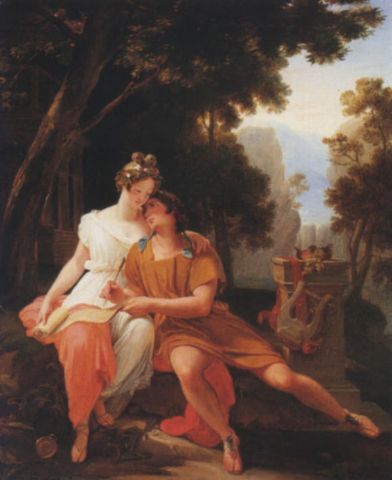„Jedes Übel in der Liebe ist leicht, wenn du es ertragen willst.“
Elegien Buch 2, V 16
Original lat.: "omne in amore malum, si patiare, leve est
Sextus Aurelius Propertius gehörte gemeinsam mit Cornelius Gallus, Tibull und Ovid zu den Vertretern der römischen Liebeselegie, die in der zweiten Hälfte des ersten Jahrhunderts v. Chr. ihre kurze Blüte hatte. Wikipedia

„Jedes Übel in der Liebe ist leicht, wenn du es ertragen willst.“
Elegien Buch 2, V 16
Original lat.: "omne in amore malum, si patiare, leve est
„Bei großen Dingen genügt es auch, sie gewollt zu haben.“
Elegiarum liber 2, 6, 10
Original lat.: "In magnis et voluisse sat est."
„Die Augen sind die Lenker in der Liebe.“
Elegien Buch 2, XV 12
Original lat.: "oculi sunt in amore duces
„Früher oder später erwartet jeden der Tod.“
Elegien Buch 2, XXVIIIc 12 und Buch 3, XVIII 26
Original lat.: "longius aut propius mors sua quemque manet
„Genie erweckt in uns allein die Frau.“
Elegien Buch 2, I
Original lat.: "ingenium nobis ipsa puella facit"
„Nichts Beharrlicheres lebt auf der Welt als ein Liebender.“
Elegien Buch 2, XVII 9
Original lat.: "durius in terris nihil est quod vivat amante"
Elegien Buch 2, XV 30
Original lat.: "verus amor nullum novit habere modum."
„Wein richtet die Schönheit zugrunde, durch Wein wird die Blüte des Lebens verdorben.“
Elegien Buch 2, XXXIIIb 11
Original lat.: "vino forma perit, vino corrumpitur aetas"
“What though strength fails? Boldness is certain to win praise. In mighty enterprises, it is enough to have had the determination.”
Quod si deficiant vires, audacia certe
Laus erit: in magnis et voluisse sat est.
Variant translation: Even if strength fail, boldness at least will deserve praise: in great endeavors even to have had the will is enough.
II, x, 5.
Elegies
“Let each man pass his days in that wherein his skill is greatest.”
Qua pote quisque, in ea conterat arte diem.
II, i, 46.
Elegies
“Love is naked, and loves not beauty gained by artifice.”
Nudus Amor formam non amat artificem.
I, ii, 8; translation by G.P. Goold
Elegies
“The sailor tells of winds, the ploughman of bulls,
the soldier counts his wounds, the shepherd his sheep.”
Navita de ventis, de tauris narrat arator,
Enumerat miles vulnera, pastor oves.
II, i, 43–4.
Elegies
“Woever he was who first depicted Amor as a boy, don’t you think it was a wonderful touch? He was the first to see that lovers live without sense.”
Quicumque ille fuit, puerum qui pinxit Amorem
nonne putas miras hunc habuisse manus?
is primum vidit sine sensu vivere amantes
II, xii, 1-3; translation by A. S. Kline
Elegies
“He errs that seeks to set a term to the frenzy of love; true love hath no bound.”
Errat, qui finem vesani quaerit amoris:
verus amor nullum novit habere modum
II, xv, 29; translation by H.E. Butler
Elegies
“Let no one be willing to speak ill of the absent.”
Absenti nemo non nocuisse velit.
II, xix, 32.
Elegies
“O like Venus attended by a thousand tender Cupids, setting foot upon the sea that gave her birth.”
Aut patrio qualis ponit vestigia ponto
Mille Venus teneris cincta Cupidinibus.
II, ii, 9-10.
Elegies
“Let each man have the wit to go his own way.”
Unus quisque sua noverit ire via.
II, xxv, 38.
Elegies
“Absence makes the heart grow fonder.”
Semper in absentes felicior aestus amantes.
II, xxxiii, 43.
Elegies
“Make way, you Roman writers, make way, Greeks!
Something greater than the Iliad is born.”
Cedite Romani scriptores, cedite Grai!
Nescio quid maius nascitur Iliade.
Of Virgil’s Aeneid.
II, xxxiv, 65.
Elegies
“I am climbing a difficult road; but the glory gives me strength.”
Magnum iter ascendo; sed dat mihi gloria vires
IV. 10. 3
Elegies
“There is something beyond the grave; death does not end all, and the pale ghost escapes from the vanquished pyre.”
Sunt aliquid Manes: letum non omnia finit,
Luridaque evictos effugit umbra rogos.
IV, vii, 1.
Elegies
“Nudus Amor formam non amat artificem.”
Love is naked, and loves not beauty gained by artifice.
I, ii, 8; translation by G.P. Goold
Elegies